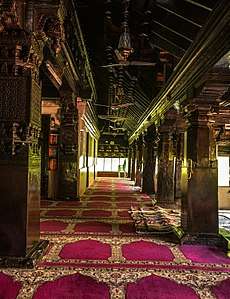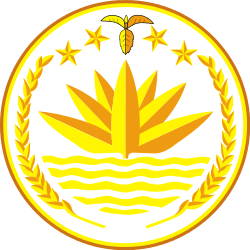Mahimal
The Mahimal (Bengali: মাহিমাল, romanized: Mahimal), also known as Maimal (Sylheti: মাইমল, romanized: Maimol), are a Bengali Muslim community of inland fishermen indigenous to the Greater Sylhet region of Bangladesh and India.[1]
| Part of a series on |
| Islam in India |
|---|
|
Administration |
|
History
|
|
Architecture |
|
Major figures
|
|
Famous Families and ethnicities
|
|
Mosques in India |
|
Influential bodies
|
Origins and history
According to the traditions of the community, the word Mahimal comes from the Persian word mahi (ماهی), which mean fish. The Mahimal are said to become Muslims through the efforts of the Sufi saint, Shah Jalal, and his disciples. They are found along the banks of the Sonai and Barak rivers, predominantly in Assam's Barak Valley districts though some can also be found in the Sylhet District. The community converse in the Sylheti dialect of the Bengali language.[1]
Present circumstances
The Mahimal were a community of inland fishermen, but most are now settled agriculturists. They are mainly marginal farmers, growing paddy and vegetables. A small number of Mahimal have taken petty trade. The Mahimal live in multi-ethnic villages, occupying their own quarters, referred to as paras. They are strictly endogamous and marry close kin. Historically, the community practised village exogamy, but this is no longer the case.
Traditionally, the Mahimals are localised on the banks and nearby areas of rivers and other natural water bodies owing to their customary occupation of fishing. So, roads and other means of modern communications lack in their villages. Even there are some village like Kalachori par where water remains at least for 6-months. The flood damages all paddy fields; there is no communication system, no road, no electricity, and the percentage of literacy is 1%. The government is not taking any steps and the gram panchayat are considered corrupt, taking all the money with the community going backward day by day.
On the socio-economic front also, they are lagging behind the other communities due to their illiteracy and backwardness in education. Due to all-round backwardness, they have been the easy prey in the clutches of the so-called high caste people.
During the early 1960s, in an attempt to emancipate this downtrodden community from the curse of socio-economic backwardness some great leaders of this community like Morhum Maulana Mumtaj uddin, Morhum Maulana Shahid Ahmed(popularly known as Raipuri sahib), Mr.Sarkum Ali (Master of Krishnapur, Hailakandi) Morhum Maulana Shamsul Islam, Morhum Foyez uddin(Master saheb of Tinghori-Bihara), Morhum Haji Sayeed Ali of Srikoan (Cachar), and few others, formed an organisation called Nikhil Cachar Muslim Fishermen Federation, with an area of operation of the then Cachar District i.e., present Barak Valley districts of State of Assam (India). This organisation led the society to give a socio-political identity and was successful to obtain the Other Backward Classes status for the Mahimals. Since the leadership of this organisation rolled through the elderly leaders only, a few educated youths of this community, in the mid-1980s, moved to form a youth wing which was later recognised under this organisation. The young leader, Like Nazmul Hassan, Maharam Ali( Of Hailakandi district.), Fakhar Uddin Ahmed, Abdul Noor Ahmed (Cachar District.) followed by many of their friends and juniors, travelled from the east to west and north to south of Barak valley districts of Assam, organised meetings and thus created a wave of self-identity among the youths of this community.
Mr. Anwarul Hoque was the one and only member of Assam Legislative Assembly. (para 2–4 added by Fakhar Uddin Ahmed).
The Mahimal have set up a statewide community association, the Maimal Federation, which deals with issues of community welfare. They are Sunni Muslims, and have customs similar to other Assamese Muslims.
On the other hand, some young energetic educated boy from Maimal community have made an organization in 2012 for the allround development of said community named "Maimal Association for Humanitarian Initiative" (MAHI). Its leaders are Professor Moulana Abdul Hamid, Mohammed Abdul Waris, Ozi Uddin Ahmed, Jubayer Ahmed and others.
References
- Marginal Muslim Communities in India edited by M.K.A Siddiqui pages 223–234

